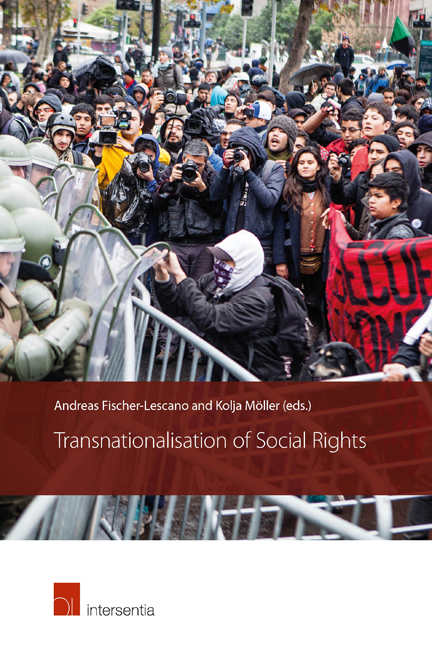Book contents
- Frontmatter
- Contents
- List of Contributors
- List of Abbreviations
- Chapter 1 Introduction
- PART I TRANSNATIONAL SOCIAL RIGHTS IN CONTEXT
- PART II FOUNDATIONS, INSTITUTIONS AND ENFORCEMENT STRUCTURES
- Chapter 5 Enforcement of Transnational Social Rights: International and National Legal Aspects
- Chapter 6 Horizontal Effects of Human Rights: The EU Proposal for a Non-Financial Reporting Framework
- Chapter 7 Labour Rights and the ILO: The Challenge of Transforming Informal Economic Activities to Promote Transnational Social Rights – Domestic and Care Work as Core Issues
- PART III ENFORCEMENT OF TRANSNATIONAL SOCIAL RIGHTS
- Index
Chapter 6 - Horizontal Effects of Human Rights: The EU Proposal for a Non-Financial Reporting Framework
from PART II - FOUNDATIONS, INSTITUTIONS AND ENFORCEMENT STRUCTURES
Published online by Cambridge University Press: 12 December 2017
- Frontmatter
- Contents
- List of Contributors
- List of Abbreviations
- Chapter 1 Introduction
- PART I TRANSNATIONAL SOCIAL RIGHTS IN CONTEXT
- PART II FOUNDATIONS, INSTITUTIONS AND ENFORCEMENT STRUCTURES
- Chapter 5 Enforcement of Transnational Social Rights: International and National Legal Aspects
- Chapter 6 Horizontal Effects of Human Rights: The EU Proposal for a Non-Financial Reporting Framework
- Chapter 7 Labour Rights and the ILO: The Challenge of Transforming Informal Economic Activities to Promote Transnational Social Rights – Domestic and Care Work as Core Issues
- PART III ENFORCEMENT OF TRANSNATIONAL SOCIAL RIGHTS
- Index
Summary
INTRODUCTION
The accountability of private actors, especially the accountability of multinational corporations (MNCs), for human rights violations is one of the most disputed issues, not only in the academic world, but also in international, regional and national politics. The question of whether private actors should be bound by human rights, and, if so, through which means and to what extent they can be held accountable, is more controversial than ever. This question is one of the major challenges in the twenty-first century. Consequently, a large number of approaches and concepts have been developed in the last decades, which aspire to solve this very question.
Regarding this issue, currently the most contested approach is the struggle to create an international binding business and human rights treaty. The debate on a binding treaty has arisen again in the course of a draft Resolution that has been submitted to the UN Human Rights Council by Ecuador and South Africa, and which was finally passed in June 2014. The Resolution stipulates the setting up of an open-ended intergovernmental working group with a mandate to elaborate an “international legally binding instrument on transnational corporations and other business enterprises with respect to human rights”. In contrast to other initiatives to hold corporations accountable for human rights violations, this approach would be a binding inter-governmental instrument that would be part of international law without any restrictions. While the realisation, possible outcome and content is highly contested and will have to be negotioated in the process set in motion by the UN Human Rights Council, the intergovernmental working group already focused, in its first session, on major topics and issues, namely, the question of the legal nature of MNCs in international law, the human rights to be covered by the instrument, the obligations of states to guarantee that human rights are respected by MNCs, including extraterritorial obligations, enhancing the responsibility (and liability) of MNCs, and the building of national, international and corporation-based mechanisms for access to remedy.
Acknowledging the major importance of a binding treaty on the issue of business and human rights, this chapter aims to address the question of the accountability of private actors, that is, the horizontal effect of human rights, from a different perspective, and to propose an unconventional approach to ascertaining the accountability of private actors for human rights violations.
- Type
- Chapter
- Information
- Transnationalisation of Social Rights , pp. 109 - 142Publisher: IntersentiaPrint publication year: 2016
- 1
- Cited by



